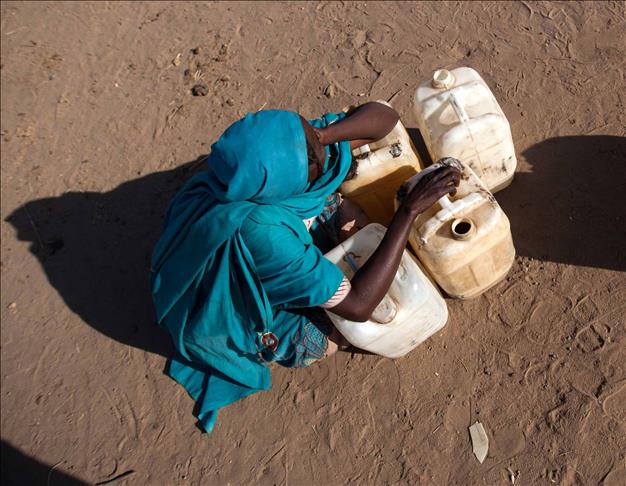
By Okech Francis
JUBA
Growing up a girl is no easy thing in South Sudan, the world's newest nation.
Many local communities still look at girls as commodities of sorts.
Among the Lotuho tribe in Eastern Equatoria State, when a person dies at the hands of another and there is need for blood compensation, a young girl from the family of the killer is often given to the family of the deceased.
"This way of appeasement is a traditional practice believed to have healing and reconciliation powers," Benjamin Ohide, a local Lotuho chief, told Anadolu Agency.
"It is believed that this young girl will at least be able to grow and bear children who will be like a replacement for the deceased," he suggested.
According to the head chief, any girl from the family of the murderer, or a close relative below the age of 18, can be selected by the deceased's family.
Once selected, the girl is completely cut off from her family and is not allowed to come back, or even think of her original family as her own.
She is assumed to be completely part of the new family, and when the time comes for marriage, she will be married off from the side of the new family.
Asked about other alternatives to this system of compensation, Ohide insisted there were none.
"There is no other means of compensation, but the chiefs are trying to advocate for alternative means of appeasement, such as payment of cattle," he told AA.
No accurate data is available on blood compensation and other forms of gender-based violence in Equatoria State.
"Information on gender-based violence generally is very difficult to keep; most victims don't report them," Francis Apiliga Lagu, communications officer for Health Link South Sudan, a community-based organization dealing with gender-based violence, told AA.
"This makes it rather difficult to track such cases," he said.
"No research has been done to that effect yet, but Health Link South Sudan is soon launching a comprehensive survey into the matter that would cover Eastern Equatoria and Lakes states," said Lagu.
"We shall be able to know better why the practice still persists, the statistics, what the affected communities think of it, and what they think alternatively," he added.
Traumatized
Jane Gama Surur, a mother in Eastern Equatoria State capital Torit, said the blood compensation experience left families traumatized.
"It's a painful experience to see your child [pay] for a crime she has not committed," she told AA. "Women feel the brunt of this practice more than men."
"This problem is exacerbated by the disrespect of women's opinions," said the mother. "Women's voices are never given the due attention and are not clearly highlighted."
"It is a bad practice that must be ended gradually or by law," insisted Surur.
Lagu, the rights activist, agrees.
"It is a very painful experience, especially to the family of the girl," he said.
"No consideration whatsoever is given to girl-child education in the communities practicing girl-child compensation," Lagu lamented. "Girls are not given as much attention as the boys in terms of education."
The activist said his NGO had scaled up activities against the practice, including awareness campaigns through radio talk-shows; focus group discussions; and the training of policemen, health workers, prison officials and local chiefs – all with the aim of stopping gender-based violence in the state, especially the practice of blood compensation.
"In partnership with the state government, we are supporting the chiefs to go on with the preaching against girl-child compensation through community meetings and radio talk-shows," Lagu told AA.
The Eastern Equatoria State government, for its part, is equally committed to ending the traditional practice.
"Girls should not be given [away] for crimes they have not committed," Rev. Johnson Sebit Donaciano, director-general of the state's Ministry of Gender, Culture and Social Development, told AA.
"We, together with the chiefs, are trying to move, preach the gospel of 'stop girl-child' compensation," he said.
"We and the chiefs also want MPs to move to their constituencies and add their voice to the need to end girl-child compensation," the official asserted.
Donaciano urged lawmakers to expedite the drafting of a law banning blood compensation.
"There is a law being drafted, though it is taking long to come out," he said. "We really want to stop this practice."
Anadolu Agency website contains only a portion of the news stories offered to subscribers in the AA News Broadcasting System (HAS), and in summarized form. Please contact us for subscription options.

